My FPGA is sending UDP packets on network using 100 mbps ethernet and a have written a MATLAB code to capture the data. The problem is i am getting very low speed in MATLAB around 50 kbps during reception. FPGA kit is connected to a gbps switch and then to PC. No internet cable in the switch. I am pasting the matlab code below. If i try to increase the speed by increasing buffer size, the packets are dropped. current settings are through hit and trial on which i receive all data successfully. IS there any way to increase data reception speed in MATLAB?
Code:: (UDP from FPGA to Matlab) clc clear all close all
u=udp('192.168.0.100','RemotePort',4660,'Localport',4661);
set(u,'DatagramTerminateMode','off');
set(u, 'InputBufferSize', 18);
set(u,'Timeout',0.1);
fopen(u);
x=tic;
for i =1:1000
a(:,i) = fread(u,18);
end
fclose(u);
delete(u);
t=toc(x);
bw = (1000*18*8)/t;
/////////////////////////////////////////////////////////
A MODIFIED VERSION OF THE ABOVE CODE (EASE OF UNDERSTANDING) + IMAGE Showing the PROBLEM
also: An image showing Data Variable with a buffer size of 20 Packets (18 bytes / Packet). Data must not be all zero as pointed in the image. It represents missed packets. /////////////////////////////////////////////////////////
clc
clear all
close all
packet_size = 18; % Size of 1 Packet
buffer_size = 1*packet_size; % Buffer to store 1024 packets each of Packet_Size
buffer_read_count = 10; % How many times the buffer must be read
u=udp('192.168.0.100','RemotePort',4660,'Localport',4661);
set(u,'DatagramTerminateMode','off');
set(u, 'InputBufferSize', buffer_size);
set(u,'Timeout',0.5);
fopen(u);
x=tic;
for i =1:buffer_read_count
[a, count] = fread(u,buffer_size); % Read the complete buffer in one Fread()
if (count == buffer_size)
data(:, i) = a; %If Read_BYtes(Count) == BufferSize Store in Data
end
end
fclose(u);
delete(u);
t=toc(x);
bw = (buffer_read_count*buffer_size*8)/t; %Speed / BW of UDP Reception
